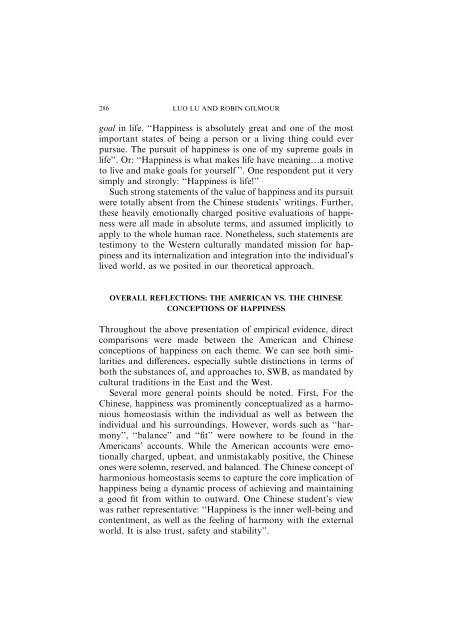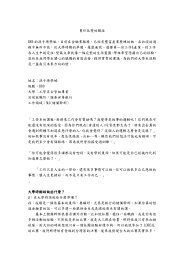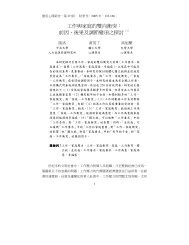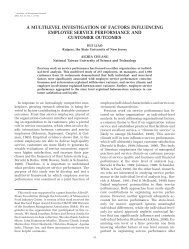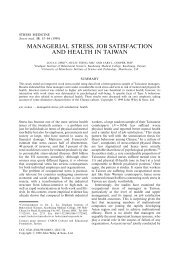CULTURE AND CONCEPTIONS OF HAPPINESS: INDIVIDUAL ...
CULTURE AND CONCEPTIONS OF HAPPINESS: INDIVIDUAL ...
CULTURE AND CONCEPTIONS OF HAPPINESS: INDIVIDUAL ...
You also want an ePaper? Increase the reach of your titles
YUMPU automatically turns print PDFs into web optimized ePapers that Google loves.
286LUO LU <strong>AND</strong> ROBIN GILMOURgoal in life. ‘‘Happiness is absolutely great and one of the mostimportant states of being a person or a living thing could everpursue. The pursuit of happiness is one of my supreme goals inlife’’. Or: ‘‘Happiness is what makes life have meaning…a motiveto live and make goals for yourself ’’. One respondent put it verysimply and strongly: ‘‘Happiness is life!’’Such strong statements of the value of happiness and its pursuitwere totally absent from the Chinese students’ writings. Further,these heavily emotionally charged positive evaluations of happinesswere all made in absolute terms, and assumed implicitly toapply to the whole human race. Nonetheless, such statements aretestimony to the Western culturally mandated mission for happinessand its internalization and integration into the individual’slived world, as we posited in our theoretical approach.OVERALL REFLECTIONS: THE AMERICAN VS. THE CHINESE<strong>CONCEPTIONS</strong> <strong>OF</strong> <strong>HAPPINESS</strong>Throughout the above presentation of empirical evidence, directcomparisons were made between the American and Chineseconceptions of happiness on each theme. We can see both similaritiesand differences, especially subtle distinctions in terms ofboth the substances of, and approaches to, SWB, as mandated bycultural traditions in the East and the West.Several more general points should be noted. First, For theChinese, happiness was prominently conceptualized as a harmonioushomeostasis within the individual as well as between theindividual and his surroundings. However, words such as ‘‘harmony’’,‘‘balance’’ and ‘‘fit’’ were nowhere to be found in theAmericans’ accounts. While the American accounts were emotionallycharged, upbeat, and unmistakably positive, the Chineseones were solemn, reserved, and balanced. The Chinese concept ofharmonious homeostasis seems to capture the core implication ofhappiness being a dynamic process of achieving and maintaininga good fit from within to outward. One Chinese student’s viewwas rather representative: ‘‘Happiness is the inner well-being andcontentment, as well as the feeling of harmony with the externalworld. It is also trust, safety and stability’’.


